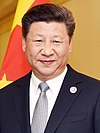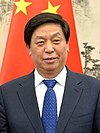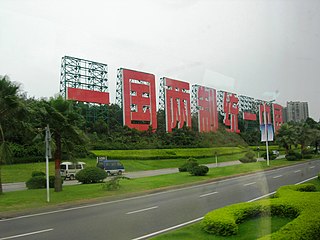
"One country, two systems" is a constitutional principle of the People's Republic of China (PRC) describing the governance of the special administrative regions of Hong Kong and Macau.

The Standing Committee of the National People's Congress (NPCSC) is the permanent body of the National People's Congress (NPC), the national legislature of the People's Republic of China. It exercises the powers of the NPC when it is not in session.

The Basic Law of the Hong Kong Special Administrative Region of the People's Republic of China is a national law of China that serves as the organic law for the Hong Kong Special Administrative Region (HKSAR). Comprising nine chapters, 160 articles and three annexes, the Basic Law was composed to implement Annex I of the 1984 Sino-British Joint Declaration.
Article 23 is an article of the Hong Kong Basic Law. It states that Hong Kong "shall enact laws on its own to prohibit any act of treason, secession, sedition, subversion against the Central People's Government, or theft of state secrets, to prohibit foreign political organizations or bodies from conducting political activities in the Region, and to prohibit political organizations or bodies of the Region from establishing ties with foreign political organizations or bodies."

Tam Yiu-chung, GBM, JP is a pro-Beijing politician in Hong Kong. He is a former member of the Standing Committee of the National People's Congress (NPCSC), former member of the Legislative Council of Hong Kong (LegCo) and former chairman of the pro-Beijing Democratic Alliance for the Betterment and Progress of Hong Kong (DAB).

Democratic reforms in Hong Kong did not seriously begin until 1984 and has faced significant challenges since 2014. The one country, two systems principle allows Hong Kong to enjoy high autonomy in all areas besides foreign relations and defence, which are responsibilities of the central government. Hong Kong's Basic Law allows residents to vote for local district councillors.

Hong Kong independence is the notion of Hong Kong as a sovereign state, independent from the People's Republic of China (PRC). Hong Kong is a special administrative region (SAR) of China and is thus granted a high degree of de jure autonomy, as stipulated by Article 2 of the Hong Kong Basic Law ratified under the Sino-British Joint Declaration. Since the transfer of the sovereignty of Hong Kong from the United Kingdom to the PRC in 1997, a growing number of Hongkongers have become concerned about what they see as Beijing's encroachment on the territory's freedoms and the failure of the Hong Kong government to deliver "genuine democracy". Advocating for Hong Kong independence became illegal after the Hong Kong national security law in 2020.

The National People's Congress (NPC) is the highest organ of state power of the People's Republic of China. The NPC is the only branch of government in China, and per the principle of unified power, all state organs from the State Council to the Supreme People's Court (SPC) are subservient to it. With 2,977 members in 2023, it is the largest legislative body in the world. The NPC is elected for a term of five years. It holds annual sessions every spring, usually lasting from 10 to 14 days, in the Great Hall of the People on the west side of Tiananmen Square in Beijing.
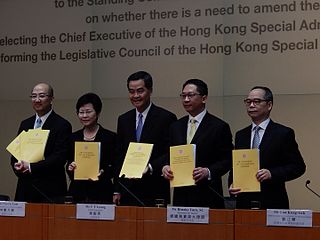
The 2014–2015 Hong Kong electoral reform was a proposed reform for the 2017 Hong Kong Chief Executive election and 2016 Legislative Council election.
The Decision of the Standing Committee of the National People's Congress on Issues Relating to the Selection of the Chief Executive of the Hong Kong Special Administrative Region by Universal Suffrage and on the Method for Forming the Legislative Council of the Hong Kong Special Administrative Region in the Year 2016, commonly known as the 31 August Decision, is a decision made by the Standing Committee of the National People's Congress (NPCSC), the national legislative body of the People's Republic of China (PRC) on 31 August 2014 which set limits for the 2017 Chief Executive election and 2016 Legislative Council election in the Hong Kong Special Administrative Region (HKSAR).

The 2021 Hong Kong Legislative Council election was a general election held on 19 December 2021 for the 7th Legislative Council of Hong Kong. Under the drastic Beijing-imposed electoral overhaul, the total number of seats was increased from 70 to 90 seats, with the directly elected geographical constituencies (GCs) reduced from 35 to 20 seats, the trade-based indirectly elected functional constituencies (FCs) staying at 30, and the additional 40 seats being elected by the 1,500-member Election Committee. therefore still not allowing universal suffrage.

The month of May in the 2019–2020 Hong Kong protests saw a resurgence of protests. This was partly due to the containment of the coronavirus pandemic, with a total of less than 50 newly reported cases, and a small uptick in cases at the end of the month. These were the first major protests erupting since early March. Tensions increased again as police employed heavy-handed tactics including towards minors and journalists.

The Decision of the National People's Congress on Establishing and Improving the Legal System and Enforcement Mechanisms for the Hong Kong Special Administrative Region to Safeguard National Security is a congressional resolution passed by the third session of the 13th National People's Congress on 28 May 2020. This resolution authorizes the National People's Congress Standing Committee to promulgate a national security law in Hong Kong.

The Law of the People's Republic of China on Safeguarding National Security in the Hong Kong Special Administrative Region is a national law of China on Hong Kong national security passed in 2020. It is implemented in Hong Kong in accordance with Hong Kong Basic Law Article 18, which allows for China's national laws to be valid in Hong Kong if they are included in Annex III. It was formulated under the authorization of the National People's Congress decision on Hong Kong national security legislation. The law was passed on 30 June 2020 by the Standing Committee of the National People's Congress as a means of resolving the anti-extradition bill protests instigated by a Hong Kong local bill proposed in 2019 to enable extradition to other territories including the mainland, and came into force the same day.

In early May 2020, the Chinese Government announced plans to draft a new national security law for Hong Kong, something required under Hong Kong Basic Law but which should explicitly be written and enacted by Hong Kong's own government. In response to apparent mainland intent to bypass Hong Kong's local legislature, the United Kingdom – which administered Hong Kong until 1997 – announced that if a security law drafted by China was approved, Britain would open a route for all Hong Kong residents born under British rule to become British citizens. Other nations and organisations have given various responses to the decision, to legislation plans, and ultimately the law itself as passed by the Chinese Standing Committee of the National People's Congress on 28 May 2020 with 2878 votes "for", 1 vote against, and 6 blank votes. At 9:30 am, 30 June 2020, the same Standing Committee unanimously voted to enact the law. The law became effective at 11 pm on the same day.

The Office for Safeguarding National Security of the Central People's Government of the People's Republic of China in the Hong Kong Special Administrative Region (OSNS) is the Chinese central government's national security office in Hong Kong. The office was established in July 2020 by the Hong Kong national security law.

Wang Wenbin is a Chinese politician and diplomat who currently serves as the Chinese Ambassador to Cambodia. He was formerly a spokesman for the Ministry of Foreign Affairs, deputy director of the Foreign Ministry Information Department, and currently a member of the Chinese Communist Party. He is the 32nd spokesperson since the position was established in the ministry back in 1983. He served as the Chinese Ambassador to Tunisia from 2018 to 2020, and has worked in Chinese embassies in Mauritius and Senegal.
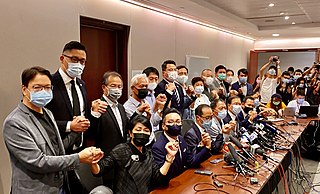
On 11 November 2020, 15 Hong Kong pro-democracy members of the Legislative Council announced their resignations in protest against the decision of the National People's Congress Standing Committee (NPCSC) which bars Legislative Council members from supporting Hong Kong independence, refusing to recognise Beijing's sovereignty over Hong Kong, seeking help from "foreign countries or foreign forces to interfere in the affairs of the region" or committing "other acts that endanger national security" that resulted in the disqualification of pro-democracy legislators Alvin Yeung, Dennis Kwok, Kwok Ka-ki and Kenneth Leung. In July 2020, the four had been barred from running in the subsequently postponed Legislative Council election originally scheduled for September 2020. The resignation en masse left the Legislative Council membership dwindled to 43 out of the total number of 70 seats, with virtually no opposition for the first time since the 1997 handover.

The 2021 Hong Kong electoral changes were initiated by the National People's Congress (NPC) on 11 March 2021 to "amend electoral rules and improve the electoral system" of the Hong Kong Special Administrative Region (HKSAR) for its Chief Executive (CE) and the Legislative Council (LegCo), in order to ensure a system in which only "patriots", according to the Chinese definition, govern Hong Kong. The reforms have been widely criticized for their negative impact on the democratic representation in the Hong Kong legislature.
The 2024 National People's Congress (NPC) was the Second Plenary Session of the 14th National People's Congress of the People's Republic of China (PRC). It was held from 5 March to 11 March 2024, concurrently with the Chinese People's Political Consultative Conference (CPPCC) as part of the annual Two Sessions. The NPC was held at the Great Hall of the People in Beijing.
